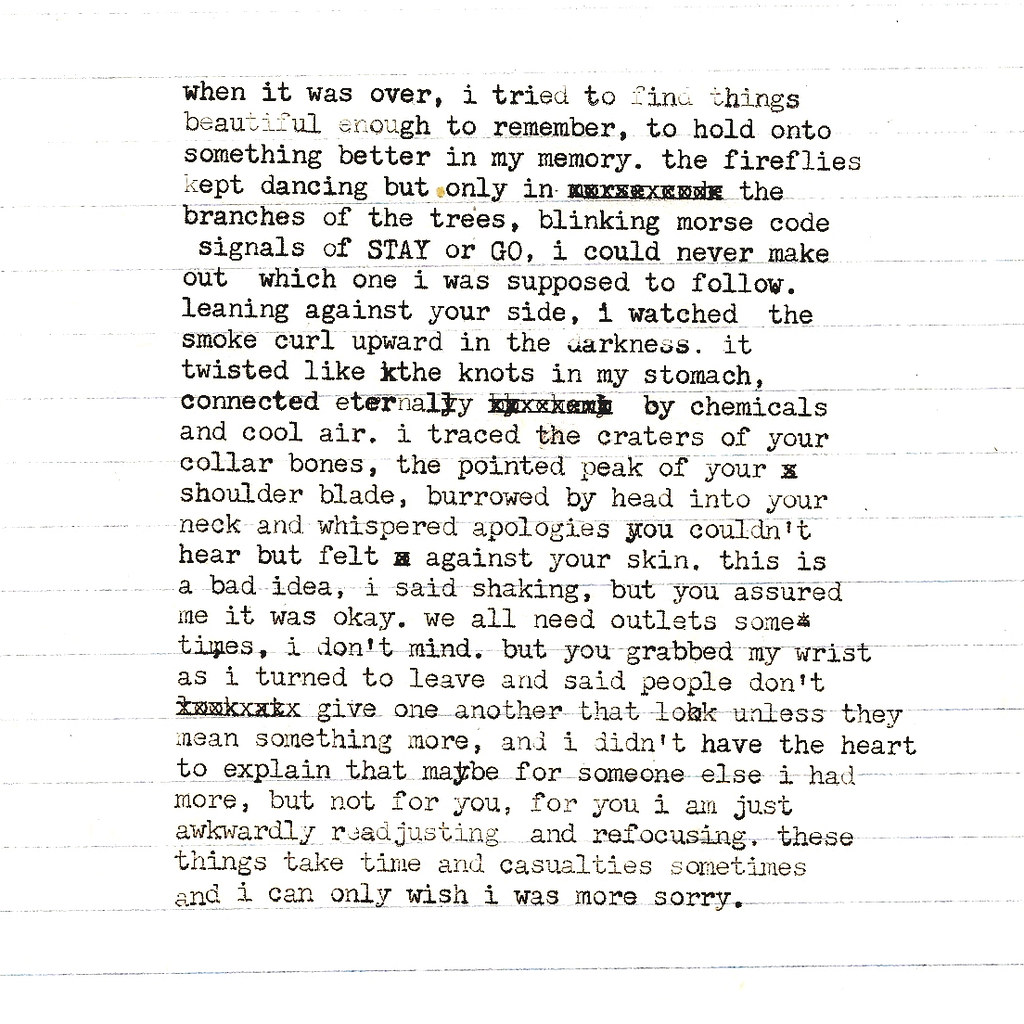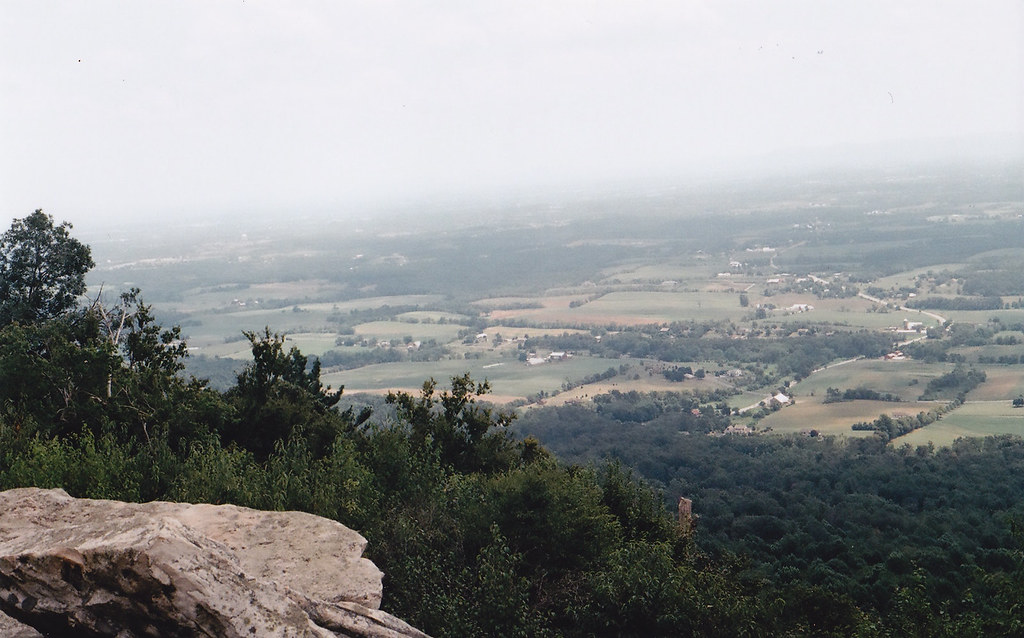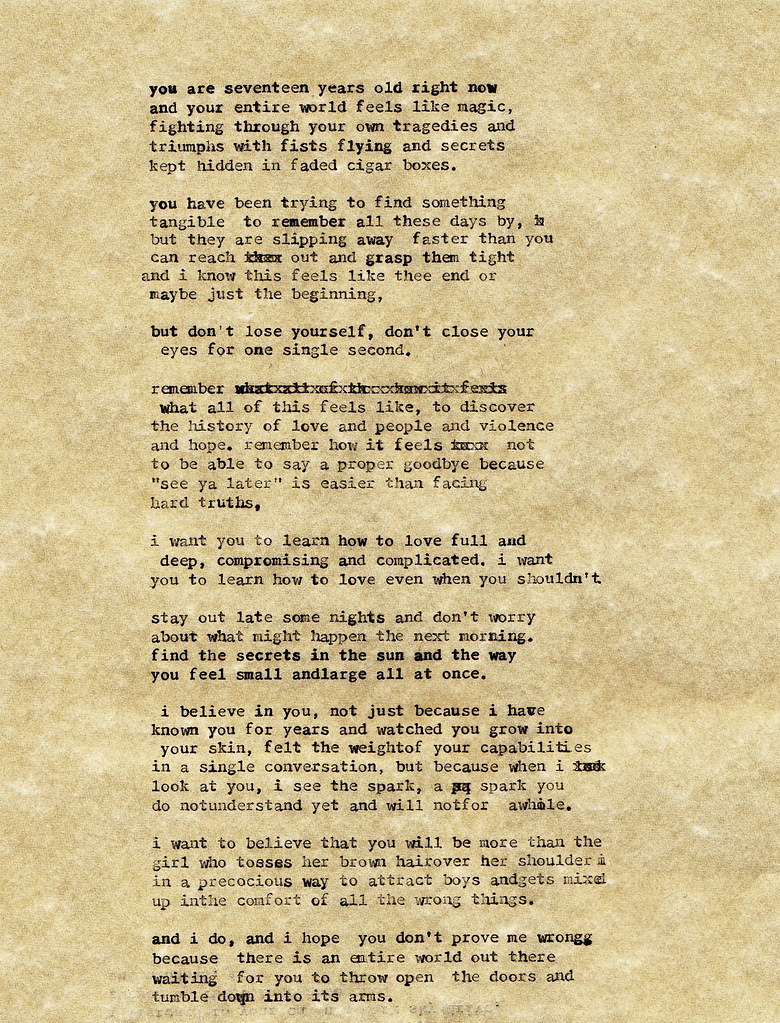Rachel is an incredibly talented writer, poet, and a student living in the Midwest. On her tumblr, Poorly Written History, she answers questions, talks about her poetry, and, occasionally, shares music. On her flickr, you can find all the published pieces of her writing. Near the end of April, I emailed Rachel asking if we could talk with her on Fernweh. Here are her responses to my questions.
Your poetry seems incredibly raw and honest. Was it hard for you when you began sharing your poetry on Poorly Written History? How has the sense of community that's developed around your blog and your flickr influenced your writing?
I was originally drawn to writing because of the connection factor. For years, I had felt the tug in my chest while pouring over novels, finding the places where I understood exactly what the author was trying to convey. It was magical. There was something incredibly powerful about the way words bridge gaps, how they stretch between people previously unattached, how something can be triggered just by a simple sentence. It was my lofty dream of being a writer—to have that same comforting influence. It wasn’t something I expected to find through an internet writing project, especially one which is essentially just a purge of my mind, a place to tuck things away. Yet I have been gifted with an incredibly community of people who reassure me not only of the validity of what I have to say, but also the way I say it. How fortunate am I, to have a place where I am given support from people I might never know. I’m damn lucky. I don’t think I’ll ever stop saying that.
You've curated several side projects, including No Shame November and Quiet Little Things. What have you learned from these projects?
No Shame November was created because I felt I had a duty to give back to people what they had given me. Having an outlet to challenge the idea of bravery, to pursue vulnerability, to release my stories allowed me to become a different person. There’s such a catharsis in writing something out of you, especially when you’ve been trying to ghost it for years. You can’t hide it anymore when you place it in a public forum—it is yours and it is exposed. I wanted people to have that opportunity on a smaller scale. The first year I did No Shame November, I was shaken. I still have certain lines echoing through my mind. It is incredible to witness the willingness of people when you give them an opportunity, and how much trust people placed in me just because they had watched me do the same. Quiet Little Things was another branch of this idea. I realized I had gained an audience and I wanted to be able to use that to get people’s voices out there. I’m always looking for ways I can push others the way I have been pushed. It feels like the least I can do.
I've noticed something popping up on your tumblr a lot in recent days...can you tell me about On the Cusp, the zine that you're involved with?
On the Cusp is a submission generated art and writing zine I piece together with two of the most talented (and cool!) people I know. For months, I had a dream of collecting work from others and publishing it. In a way, it would be a tangible manifestation of previous online-only projects. I wanted to take the next step. But at the same time, it seemed incredibly daunting. No matter how small the publication, it takes work for it to become a success. Luckily, when I brought it up to two fellow creators, they were more than thrilled to help me out. Bi-monthly, we collect submissions from all over the world revolving around a certain theme. After, we sit around and choose the best pieces. They are then formatted into a 40 page booklet, printed up and sold to happy readers. We’ve had incredible success so far, more than I could have ever imagined. Currently, we are packaging up out third issue, echo, and the next theme will be announced within the week. Ideally, we’d like to branch into more publishing endeavors and push this as far as we can. Without sounding too much like an overzealous zine mom (which I totally am), I highly encourage everyone to send in your work, purchase a copy, or spread the word to your friends.
What advice would give to someone who's trying to be more honest with what they write?
This past semester, I taught a girl who refused to turn in anything to her nonfiction workshop simply because she was afraid to have it read aloud in class. As someone who has a rampant fear of being “that girl,” I understood to an extent. But at the same time, it made me think about how I could convince someone to find comfort in honesty.
Here’s my list of top 5 things:
- Start small. Write wildly bad prose in every hidden place you possibly can—journals, old receipt tape at work, post-it notes shoved in your pockets, your phone. Practice developing an intimate relationship with your words. Don’t worry about who might see. This is for you.
- Read painfully honest nonfiction books and essays, interviews with people who have taken risks by exposing themselves in their work. Underline every passage that makes you squirm, every passage you think might have made the writer squirm.
- Start talking about the things that make you cringe in the dark with friends, driving around in cars with the windows down, standing on empty blocks with your hands thrown in the air. Play “I’ll show you mine if you show me yours” with your secrets. Let your voice become soft and hazy with inhibitions over phone lines late at night. Practice oral storytelling. When something gets caught in your throat, remember it. This is where the story lies.
- Rewrite your scribbles—no matter what form. Craft them into something. It is okay if you can’t get the whole story out yet. Allow yourself to slant things if needed. Be as vague as you must allow yourself. If you want to share them with friends, post them on the internet. Don’t worry if people read, or don’t read. This is an exercise for you, alone.
- Remember, above all, that you have so many stories inscribed within your skin that no one else can tell the way you do. They are all important, they are all valid, they all have the potential to shake someone up. And really, what are you so afraid of?
I’m actually a fiction writing major, though I rarely write a fictional piece with enthusiasm. I spent my workshop class this past semester writing a nonfiction piece about a road trip I took to North Carolina last summer. Despite my gripes, immersing myself in a type of writing I’m not comfortable with has helped me realize I shouldn’t let myself be hindered by the truth. Allowing details to be bent to better a story is perfectly acceptable. No matter what class I’m taking—from Small Press Publishing to Tutor Training, Beginning Poetry to First Novels—I’m being asked to view my work in a different light, to think about writing in a new way. That’s something exciting and incredibly helpful. Even if you struggle through your poetry workshop, you are still picking up tools to weave into other types of writing, understanding the rules of the game and how to heighten your work to make it better than it was before. Being open to this is absolutely crucial.
I know that you don't like recommending music (I'm the same way); however, what is some music that you love? No recommendations, just opinions.
I’m a sucker for sad songs and rap music. That’s all there is to it, really.

Your flickr account is full of words. What's your favorite thing you've written? Or, alternatively, what are you most proud of?
While I don’t think I’ll ever be able to call a certain piece my “favorite,” I can say I feel that little swell in my chest when I read something I wrote and it hits exactly what I was trying to convey. My series from last summer, “Things We Tell Ourselves in the Dark” has certain pieces that still resonate with the desperateness I was experiencing. Many of the long form pieces I wrote in my “coincidences” set still ache. It is fun to write about my current relationship because I’m seeing how I let my past writhe through my present. I’m proud of where I’ve been, where I’ll go. It is nice to have reminders of that.
I read a quote a few days ago that said, talking about what she learned from Anne Lamott's books, “‘Sometimes you’re not blocked, you’re empty’ – if you are an artist of any kind, or if you are trying to get any kind of large-scale project accomplished, you know that “writer’s block” is always at your heels, that jinxed feeling that the gig is up, and no matter how long you stare at the blank screen, you’ve got nothing. Less than nothing. Anne Lamott reminds me that sometimes the problem isn’t that I’m blocked but that I’m empty. Perhaps I need to spend some time filling up again, engaging in the small moments of inspiration that provide energy for the work. a walk outside. a conversation. Using ultra fine tip sharpie markers in a journal. Rest. etc. This is some of the best advice I have ever heard. Instead of trying to push past the block, perhaps the best thing to do is go about filling up.” In regards to this, what do you do when you're drained, and empty, and the words won't come?
Often, I find myself experiencing what I call “writer’s exhaustion.” It isn’t that I don’t have anything to say—there’s always a million things pressing at my fingertips—but sometimes the mind (and heart) become so tired process shifts from being enjoyable, rewarding, important and feels difficult. Throw in a self censorship issue: things being too close, worrying you won’t do them justice, wondering if it is worth writing and I’ll find myself frustrated. It takes a moment of pause. Usually, I just need to return to a place of where I feel more comfortable. Open up a notebook and write something entirely different—party and bullshit prose just to get some of that anxiety out. Get to the root of things. It helps to remove the phrase “I can’t” from your vocabulary. If you are trying to work on something fictional, switch to nonfiction—your past provides a wealth of stories. If the form is challenging you, write it shorter and expand later. Anything to jog you away from whatever you are struggling with.
Words are art. However, is there any other sort of art form that you're involved in? What inspires you?
I’m a sucker for writing—always have been, always will be. But the artistic possibilities stemming from that—creating little publications, performance poetry, oral storytelling—is forever catching me by storm. They all hold unique possibilities of stretching your boundaries, something I love. As for inspiration, I am just constantly fascinated by human interaction, by the way our relationships echo throughout us, how we build and manipulate ourselves. Growth, in essence. Living in a city has strengthened my observational skills. Memory is hugely important to me. I just constantly want to absorb everything I possibly can, to find a story in both myself and those I touch briefly.
Thank you so much, Rachel!











this is way too fantastic. i can't even being to explain.
ReplyDeleteindeed.
DeleteWoooww. That was an awesome guest post//interview. It was extremely helpful, and I really enjoy her writing. Thank for coming on fernweh! :)
ReplyDeletehonestly, there are no words for this. i am an inspired writer again. oh, thank you. i love this so much. more than i can say.
ReplyDelete♥ kailyn
I just loved this interview!!
ReplyDeleteHannah
thewritingsofhannah.blogspot.com
fantastic interview. It's cool to see someone who's where you would like to be someday--honest and always writing.
ReplyDeletewow. Loved this interview!! Inspired
ReplyDeleteher poetry is amazing -- just my style. thanks for sharing, rachel!
ReplyDeleteThis is so wonderful. I love her advice about becoming comfortable with honesty. This was so inspiring.
ReplyDeleteThank you for doing this interview, Katie, and thank you to Rachel for her replies.
This is amazing! I loved this
ReplyDeleteIt also inspired me to get creative and write some poetry of my own, something I've been wanting to do for a while but haven't because the words "I can't" are always stuck in my mind. And it was freeing, and wonderful
Thanks for sharing, Rachel
her advice and her poetry is incredible. this is so inspiring!
ReplyDeletelovely.
ReplyDelete